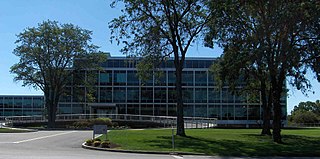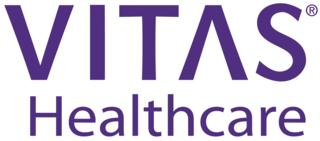Related Research Articles

Medicare is a government national health insurance program in the United States, begun in 1965 under the Social Security Administration (SSA) and now administered by the Centers for Medicare and Medicaid Services (CMS). It primarily provides health insurance for Americans aged 65 and older, but also for some younger people with disability status as determined by the SSA, including people with end stage renal disease and amyotrophic lateral sclerosis.

AARP, formerly the American Association of Retired Persons, is an interest group in the United States focusing on issues affecting those over the age of fifty. The organization, which is headquartered in Washington, D.C., said it had more than 38 million members as of 2018. The magazine and bulletin it sends to its members are the two largest-circulation publications in the United States.

The Cigna Group is a for-profit American multinational managed healthcare and insurance company based in Bloomfield, Connecticut. Its insurance subsidiaries are major providers of medical, dental, disability, life and accident insurance and related products and services, the majority of which are offered through employers and other groups. Cigna is incorporated in Delaware.
Humana Inc. is a for-profit American health insurance company based in Louisville, Kentucky. In 2023, the company ranked 42 on the Fortune 500 list, which made it the highest ranked company based in Kentucky. It is the fourth largest health insurance provider in the U.S.
Single-payer healthcare is a type of universal healthcare in which the costs of essential healthcare for all residents are covered by a single public system.
The term managed care or managed healthcare is used in the United States to describe a group of activities intended to reduce the cost of providing health care and providing American health insurance while improving the quality of that care. It has become the predominant system of delivering and receiving American health care since its implementation in the early 1980s, and has been largely unaffected by the Affordable Care Act of 2010.
...intended to reduce unnecessary health care costs through a variety of mechanisms, including: economic incentives for physicians and patients to select less costly forms of care; programs for reviewing the medical necessity of specific services; increased beneficiary cost sharing; controls on inpatient admissions and lengths of stay; the establishment of cost-sharing incentives for outpatient surgery; selective contracting with health care providers; and the intensive management of high-cost health care cases. The programs may be provided in a variety of settings, such as Health Maintenance Organizations and Preferred Provider Organizations.
UnitedHealth Group Incorporated is an American multinational health insurance and services company based in Minnetonka, Minnesota. Offering insurance products under UnitedHealthcare, and health care services and care delivery aided by technology and data under Optum, it is the world's eleventh-largest company by revenue and the largest health care company by revenue.
In the healthcare industry, pay for performance (P4P), also known as "value-based purchasing", is a payment model that offers financial incentives to physicians, hospitals, medical groups, and other healthcare providers for meeting certain performance measures. Clinical outcomes, such as longer survival, are difficult to measure, so pay for performance systems usually evaluate process quality and efficiency, such as measuring blood pressure, lowering blood pressure, or counseling patients to stop smoking. This model also penalizes health care providers for poor outcomes, medical errors, or increased costs. Integrated delivery systems where insurers and providers share in the cost are intended to help align incentives for value-based care.
Health care prices in the United States of America describe market and non-market factors that determine pricing, along with possible causes as to why prices are higher than in other countries.

The Medicare for All Act, also known as the Expanded and Improved Medicare for All Act or United States National Health Care Act, is a bill first introduced in the United States House of Representatives by Representative John Conyers (D-MI) in 2003, with 38 co-sponsors. In 2019, the original 16-year-old proposal was renumbered, and Pramila Jayapal (D-WA) introduced a broadly similar, but more detailed, bill, HR 1384, in the 116th Congress. As of November 3, 2019, it had 116 co-sponsors still in the House at the time, or 49.8% of House Democrats.
Centene Corporation is a publicly traded managed care company based in St. Louis, Missouri, which is an intermediary for government-sponsored and privately insured healthcare programs. Centene ranked No. 25 on the 2023 Fortune 500.
In the United States, health insurance helps pay for medical expenses through privately purchased insurance, social insurance, or a social welfare program funded by the government. Synonyms for this usage include "health coverage", "health care coverage", and "health benefits". In a more technical sense, the term "health insurance" is used to describe any form of insurance providing protection against the costs of medical services. This usage includes both private insurance programs and social insurance programs such as Medicare, which pools resources and spreads the financial risk associated with major medical expenses across the entire population to protect everyone, as well as social welfare programs like Medicaid and the Children's Health Insurance Program, which both provide assistance to people who cannot afford health coverage.
Medicare Advantage is a capitated program for providing Medicare benefits in the United States. Under Part C, Medicare pays a sponsor a fixed payment. The sponsor then pays for the health care expenses of enrollees. Sponsors are allowed to vary the benefits from those provided by Medicare's Parts A and B as long as they provide the actuarial equivalent of those programs. The sponsors vary from primarily integrated health delivery systems to unions to other types of non profit charities to insurance companies. The largest sponsor is a hybrid: the non profit charity AARP using UnitedHealth.

SCAN Health Plan (SCAN) is a not-for-profit, Medicare Advantage based in Long Beach, California. Founded in 1977, SCAN provides healthcare coverage to Medicare beneficiaries in California, Arizona, Texas and Nevada, serving more than 285,000 members. It is one of the largest not-for-profit Medicare Advantage plans in the country. SCAN Health Plan is part of SCAN Group. In 2022, SCAN and CareOregon announced their intention to combine and form a non-profit healthcare organization under the name HealthRight Group.
The healthcare reform debate in the United States has been a political issue focusing upon increasing medical coverage, decreasing costs, insurance reform, and the philosophy of its provision, funding, and government involvement.
Bundled payment is the reimbursement of health care providers "on the basis of expected costs for clinically-defined episodes of care." It has been described as "a middle ground" between fee-for-service reimbursement and capitation, given that risk is shared between payer and provider. Bundled payments have been proposed in the health care reform debate in the United States as a strategy for reducing health care costs, especially during the Obama administration (2009–2016). Commercial payers have shown interest in bundled payments in order to reduce costs. In 2012, it was estimated that approximately one-third of the United States healthcare reimbursement used bundled methodology.
Healthcare in the United States is largely provided by private sector healthcare facilities, and paid for by a combination of public programs, private insurance, and out-of-pocket payments. The U.S. is the only developed country without a system of universal healthcare, and a significant proportion of its population lacks health insurance.
An accountable care organization (ACO) is a healthcare organization that ties provider reimbursements to quality metrics and reductions in the cost of care. ACOs in the United States are formed from a group of coordinated health-care practitioners. They use alternative payment models, normally, capitation. The organization is accountable to patients and third-party payers for the quality, appropriateness and efficiency of the health care provided. According to the Centers for Medicare and Medicaid Services, an ACO is "an organization of health care practitioners that agrees to be accountable for the quality, cost, and overall care of Medicare beneficiaries who are enrolled in the traditional fee-for-service program who are assigned to it".

VITAS® Healthcare is a provider of end-of-life care in the United States. Operating 50 hospice programs in 14 states and the District of Columbia, VITAS employs 10,000 professionals and serves an average daily census of more than 17,000 patients, according to the company's website.
CareFirst BlueCross BlueShield is a health insurance provider serving 3.5 million individuals and groups in Maryland and the Washington metropolitan area. It has dual headquarters in Baltimore, Maryland and Washington, D.C. It is a nonprofit organization and an independent licensee of the Blue Cross Blue Shield Association.
References
- ↑ "NAHC's Dombi: Many Medicare Advantage Insurers Do Not Value In-Home Care". Home Healthcare News. 8 October 2018. Retrieved 25 October 2018.
- ↑ "Homecare for Seniors Act Introduced to House". Homecare. 16 September 2018. Retrieved 25 October 2018.
- ↑ "Exploring Employment and Training Trends in Homecare". Homecare. 10 October 2018. Retrieved 25 October 2018.
- ↑ "As the US population ages, the need for home health-care workers skyrockets". CNBC. 1 June 2018. Retrieved 25 October 2018.
- ↑ "Home Health, Hospice Lack Data Sharing Standards". Home healthcare news. 8 October 2018. Retrieved 25 October 2018.